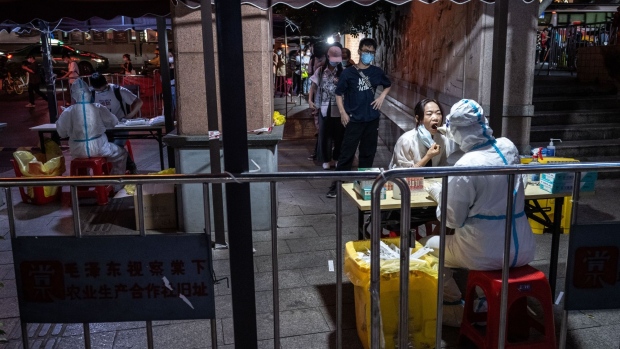Nov 9, 2022
Covid Curbs Increased in China Factory Hub Guangzhou as Outbreak Balloons
, Bloomberg News

(Bloomberg) -- China is increasing Covid restrictions in some of its biggest cities, including the capital Beijing, as officials ramp up efforts to tame swelling outbreaks that have pushed the national case tally to the highest in more than six months.
The megacity of Chongqing, which is home to more than 32 million people, is grappling with its worst outbreak in more than a year with cases climbing to 753 on Wednesday from just nine at the start of the month. Schools and non-essential businesses in two districts have been shut and residents are being encouraged to stay at home unless they’re going out for necessities and work.
Chen Min’er, the Communist Party chief of the city, said the Covid situation is “very severe” and controlling it is the top priority, according to a government statement.
The southern manufacturing powerhouse of Guangzhou -- home to many garment manufacturers as well as automakers like EV company Xpeng Inc. -- is the center of China’s most significant outbreak. The city detected 2,555 of the country’s total 8,494 new infections, the highest national tally since late-April. In-person classes in eight of the city’s 11 districts have been halted starting Thursday. That follows the lock down of three districts, with the order confining residents to their homes except for activities like grocery shopping.
Guangdong’s provincial party secretary Huang Kunming visited Haizhu, the locked down area where most of Guangzhou’s virus cases are found, on Wednesday and said authorities will take decisive measures to control the outbreak quickly, protect the public’s health and safety, and keep the impact to the economy at a minimum, according to a government statement.
China’s CSI 300 Index fell more than 1% on Thursday, while a gauge of Chinese stocks traded in Hong Kong dropped more than 2%.
While small by global standards, the growing caseloads across the major cities are helping to drive the national count to levels not seen since Shanghai’s massive outbreak in the spring. The persistent flareups raise the risk of more stringent action from authorities, threatening further disruption to an economy that’s already been hammered by the country’s adherence to a strict Covid Zero policy.
Elsewhere, Beijing posted 95 cases for Wednesday, the highest since May. The capital shut more than 10 tourist attractions, including Yonghe Temple and Ditan Park, while local media outlet Cailian Press reported more than 75% of flights at Beijing’s two airports were canceled on Nov. 9.
Explore Bloomberg’s Exclusive China Covid Dashboard on the Terminal
So far, officials seem to be following recently reinforced directions from Beijing to be less obtrusive in enforcing Covid Zero, holding back in imposing a more sweeping lockdown despite signs the virus was spreading in Guangzhou. The order has seen authorities elsewhere be more covert with their restrictions, imposing curbs incrementally, neighborhood-by-neighborhood, and in some cases not making any announcements at all. Some residents have only discovered they’re in lockdown when arriving home.
The world’s biggest iPhone factory remains under Covid restrictions despite a wider lockdown on the area where the plant is located being lifted on Wednesday. The government in Zhengzhou, a city in central China, reported a surge to 1,228 infections for Wednesday.
The Foxconn Technology plant -- known as “iPhone City” for its size -- was in an area still deemed high risk, meaning lockdown-like curbs still apply, including a stay-at-home order. The factory remains in a so-called closed loop system, a Foxconn representative said Wednesday.
Read more: China Extends Covid Restrictions on World’s Biggest IPhone Plant
--With assistance from Phila Siu.
(Updates to add details throughout.)
©2022 Bloomberg L.P.






